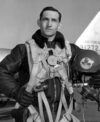George A. Davis Jr. Medal of Honor citation
The President of the United States in the name of The Congress takes pride in presenting the MEDAL OF HONOR posthumously to
MAJOR
GEORGE ANDREW DAVIS, JR.
AIR FORCE
For service as set forth in the following:
CITATION:
For The President of the United States of America, in the name of Congress, takes pride in presenting the Medal of Honor (Posthumously) to Major George Andrew Davis, Jr. (ASN: 0-671514/13035A), United States Air Force, for conspicuous gallantry and intrepidity at the risk of his life above and beyond the call of duty while serving with the 334th Fighter Squadron, 4th Fighter Wing, Fifth Air Force in action against enemy forces near Sinuiju-Yalu River, Korea, on 10 February 1952. While leading a flight of four F-86 Saberjets on a combat aerial patrol mission near the Manchurian border, Major Davis’ element leader ran out of oxygen and was forced to retire from the flight with his wingman accompanying him. Major Davis and the remaining F-86’s continued the mission and sighted a formation of approximately twelve enemy MIG-15 aircraft speeding southward toward an area where friendly fighter-bombers were conducting low level operations against the Communist lines of communications. With selfless disregard for the numerical superiority of the enemy, Major Davis positioned his two aircraft, then dove at the MIG formation. While speeding through the formation from the rear he singled out a MIG-15 and destroyed it with a concentrated burst of fire. Although he was now under continuous fire from the enemy fighters to his rear, Major Davis sustained his attack. He fired at another MIG-15 which, bursting into smoke and flames, went into a vertical dive. Rather than maintain his superior speed and evade the enemy fire being concentrated on him, he elected to reduce his speed and sought out still a third MIG-15. During this latest attack his aircraft sustained a direct hit, went out of control, then crashed into a mountain 30 miles south of the Yalu River. Major Davis’ bold attack completely disrupted the enemy formation, permitting the friendly fighter-bombers to successfully complete their interdiction mission. Major Davis, by his indomitable fighting spirit, heroic aggressiveness, and superb courage in engaging the enemy against formidable odds exemplified valor at its highest.
 Born: 1 December 1920, Dublin, Texas… Enlisted in Army in 1942 before becoming aviation cadet… One of only seven US pilots to become an ace in two conflicts, shooting down seven Japanese planes during World War II and 14 during the Korean War… One of just seven U.S. pilots to earn ace status in two wars… Also awarded the Distinguished Service Cross, three Silver Stars, three Distinguished Flying Crosses, and the Purple Heart… Interred: City of Lubbock Cemetery, Lubbock, Texas
Born: 1 December 1920, Dublin, Texas… Enlisted in Army in 1942 before becoming aviation cadet… One of only seven US pilots to become an ace in two conflicts, shooting down seven Japanese planes during World War II and 14 during the Korean War… One of just seven U.S. pilots to earn ace status in two wars… Also awarded the Distinguished Service Cross, three Silver Stars, three Distinguished Flying Crosses, and the Purple Heart… Interred: City of Lubbock Cemetery, Lubbock, Texas
